- Home
- John le Carré
The Tailor of Panama
The Tailor of Panama Read online
PRAISE FOR THE TAILOR OF PANAMA
A major motion picture from Columbia Pictures
A New York Times Notable Book
“Riveting . . . le Carré has cut another masterpiece.”
—Los Angeles Times
“Entertaining. . . . A riotous, readable novel. . . . A worthy successor to Graham Greene’s most wicked entertainments.”
—The New York Times
“Le Carré is a master of comic timing, colourful character, authentic voice . . . and we are inevitably caught in [his] spell. What the book also has . . . is a marvellous sense of place. Le Carré’s evocation of Panama is rich in surreal detail and brilliantly rendered character; faced with such a barrage of style and skill, we willingly believe.”
—The Vancouver Sun
“Le Carré is at the top of his form in setting up this spy story about the creation—out of whole cloth, perhaps—of a spy story, a looking-glass world where the dupers and the duped are hard to tell apart. . . . Its artistry makes mere events seem ho-hum.”
—Time
“Be prepared for savage novelty . . . Le Carré’s writerly skills are at work in The Tailor of Panama. The pace is nonstop, scenes are cleanly and economically written, and flashbacks are incorporated seamlessly into the narrative . . . the conclusion, which probably should not come as a surprise, resoundingly does.”
—Norman Rush, The New York Times Book Review
“Le Carré shows what an extraordinarily witty writer he can be, with a true feeling for the farcical. . . . [He] is not found wanting when the comedy turns dark, as it must. . . . Pendel assumes a dignity and a fortitude that turns him from buffoon to poignant hero, and makes him, in the end, a character quite as memorable as any le Carré has given us.”
—The Sunday Times
“This stands as one of his greatest novels.”
—The Record (Kitchener-Waterloo)
“Le Carré, at the height of his considerable powers, reveals with a wink and a smile the skull beneath the skin of a mad century.”
—People
“In every angle of light, this is a wonderful book. It’s as if le Carré had taken certain narrative strands from Graham Greene at his sunniest (Our Man in Heaven) and his darkest (The Heart of the Matter) and woven them expertly into a single riveting tale, populated by vividly rendered central characters and hilarious bit-players. . . . The Tailor of Panama is not just a brilliant spy novel. It’s brilliant, period.”
—The Globe and Mail
“An excoriating denunciation of hypocritical diplomacy, opportunistic high politics and exploitative journalism which explodes in an apocalyptic climax.”
—The Sunday Telegraph
“In this spicy tale of New Age spookery, rich in dialogue and serpentine manipulations, it is the Brits who are corrupt, with a cast of Panamanians skillfully drawn and painted with differing shades of sympathy. . . . Delightfully pointed and hilarious. . . . A well-crafted tale whose thread is studded with funny and moving episodes, as well as pointed asides.”
—The Guardian
“This marvelous farce of intelligence fabrication extends le Carré’s range into comedy yet is streaked with tragic undertones of human imperfections.”
—Daily Mail
“Vigorous and engaging, rich in the character of the locale, disturbing and funny at times. . . . The real action is something like beauty, unfolding not quite in but behind, the eye of the beholder.”
—Boston Globe
“All the characters . . . are rendered with breathtaking accuracy; and the careening plot, by turns uproarious, cynical, and ultimately tragic, is brought off with seemingly effortless virtuosity. Le Carré remains far in front of his field, a startlingly up-to-date storyteller who writes as well about the shadows around the power elite as anyone alive.”
—Publishers Weekly
“A hilariously funny, knowing, sardonic, and biting take on the politics of the new American imperial age. Nobody has written a better spy novel this year. Le Carré has just renewed his patent.”
—Daily News
“A romantic delirium for troubled times.”
—The Observer
“There is no disputing the fact that John le Carré is one of the great masters of the spy novel. . . . [The Tailor of Panama] repays the reader on almost every page.”
—Financial Post
“Pendel is an exaggeration of the pleaser hidden in all of us. And that’s what makes reading this novel such a fascinating and unsettling experience. It is a glimpse less into post–Cold War intrigue than into the mysteries of the human heart.”
—The Gazette
“Le Carré is on top form—rich, subtle, and powerfully imaginative.”
—Maxim
“The tale is told with pace and verve and shows the author on top form.”
—Yorkshire Post
“The idea of the invented self has been lurking in John le Carré’s work for decades, surfacing predominantly in A Perfect Spy and now in this brilliantly multilayered account of a British tailor in Panama whose manufactured universe collides tragically with reality.”
—Booklist
“It’s a mordant pleasure to watch the structure collapse, along with the fate of nations, in exquisitely choreographed slow motion. Le Carré goes back to the spy story’s roots —Our Man in Havana with a touch of Conrad’s Secret Agent—to amuse frazzled millennialists with the refreshing news that we’ve all been here many times before.”
—Kirkus Reviews
“Enchanting writing, perception, wit, characters that reach out of the pages and grab your heart, tensions which would explode with the prick of a pin. This is the le Carré that the macho gung-ho reviewers have kept secret from more sensitive souls for too long.”
—Irish Independent
“A writer whose novels are both a literary event and a treat to be enjoyed by a vast discriminating public . . .”
—Evening Standard
“Arguably his best book since The Spy Who Came in from the Cold. A masterful portrayal of human weakness.”
—The Times Literary Supplement
PENGUIN CANADA
THE TAILOR OF PANAMA
JOHN LE CARRÉ was born in 1931. He was educated at the Universities of Bern and Oxford, taught at Eton College, and served as second secretary at the British Embassy in Bonn and British Consul in Hamburg during the Cold War. His third novel, The Spy Who Came in from the Cold, secured him a wide reputation, which was consolidated by his trilogy Tinker, Tailor, Soldier, Spy; The Honourable Schoolboy; and Smiley’s People. His recent work includes The Constant Gardener and The Mission Song. His new novel, A Most Wanted Man, will be published in autumn 2008.
ALSO BY JOHN LE CARRÉ
Call for the Dead
A Murder of Quality
The Spy Who Came in from the Cold
The Looking Glass War
A Small Town in Germany
The Naïve and Sentimental Lover
Tinker, Tailor, Soldier, Spy
The Honourable Schoolboy
Smiley’s People
The Little Drummer Girl
A Perfect Spy
The Secret Pilgrim
The Night Manager
Our Game
The Tailor of Panama
Single & Single
The Constant Gardener
Absolute Friends
The Mission Song
JOHN
LE CARRÉ
THE TAILOR
OF PANAMA
PENGUIN CANADA
Published by the Penguin Group
Penguin Group (Canada), 90 Eglinton Avenue East, Suite 700, Toronto, Ontario, Canada M4P 2Y3
(a division of Pear
son Canada Inc.)
Penguin Group (USA) Inc., 375 Hudson Street, New York, New York 10014, U.S.A.
Penguin Books Ltd, 80 Strand, London WC2R 0RL, England
Penguin Ireland, 25 St Stephen’s Green, Dublin 2, Ireland (a division of Penguin Books Ltd)
Penguin Group (Australia), 250 Camberwell Road, Camberwell, Victoria 3124, Australia
(a division of Pearson Australia Group Pty Ltd)
Penguin Books India Pvt Ltd, 11 Community Centre, Panchsheel Park, New Delhi – 110 017, India
Penguin Group (NZ), 67 Apollo Drive, Rosedale, North Shore 0632, New Zealand (a division of Pearson New Zealand Ltd)
Penguin Books (South Africa) (Pty) Ltd, 24 Sturdee Avenue, Rosebank, Johannesburg 2196, South Africa
Penguin Books Ltd, Registered Offices: 80 Strand, London WC2R 0RL, England
First published in a Viking Canada hardcover by Penguin Group (Canada),
a division of Pearson Canada Inc., 1996.
Published in Penguin Canada paperback by Penguin Group (Canada),
a division of Pearson Canada Inc., 1997.
Published in this edition, 2008.
1 2 3 4 5 6 7 8 9 10 (WEB)
Copyright © David Cornwell, 1996
All rights reserved. Without limiting the rights under copyright reserved above, no part of this publication may be reproduced, stored in or introduced into a retrieval system, or transmitted in any form or by any means (electronic, mechanical, photocopying, recording or otherwise), without the prior written permission of both the copyright owner and the above publisher of this book.
Publisher’s note: This book is a work of fiction. Names, characters, places and incidents either are the product of the author’s imagination or are used fictitiously, and any resemblance to actual persons living or dead, events, or locales is entirely coincidental.
Manufactured in Canada.
LIBRARY AND ARCHIVES CANADA CATALOGUING IN PUBLICATION
Le Carré, John, 1931–
The tailor of Panama / John le Carré.
ISBN 978-0-14-316953-6
I. Title.
PR6062.E42T35 2008 823’.914 C2008-902724-8
Except in the United States of America, this book is sold subject to the condition that it shall not, by way of trade or otherwise, be lent, re-sold, hired out, or otherwise circulated without the publisher’s prior consent in any form of binding or cover other than that in which it is published and without a similar condition including this condition being imposed on the subsequent purchaser.
Visit the Penguin Group (Canada) website at www.penguin.ca
Special and corporate bulk purchase rates available; please see
www.penguin.ca/corporatesales or call 1-800-810-3104, ext. 477 or 474
In memory of
Rainer Heumann,
literary agent, gentleman, and friend
“Quel Panama!”
Expression current
in France in the early years of this century:
describes an insoluble mess.
(See McCullough’s admirable
The Path Between the Seas.)
1
It was a perfectly ordinary Friday afternoon in tropical Panama until Andrew Osnard barged into Harry Pendel’s shop asking to be measured for a suit. When he barged in, Pendel was one person. By the time he barged out again Pendel was another. Total time elapsed: seventy-seven minutes according to the mahogany-cased clock by Samuel Collier of Eccles, one of the many historic features of the house of Pendel & Braithwaite Co. Limitada, Tailors to Royalty, formerly of Savile Row, London, and presently of the Vía España, Panama City.
Or just off it. As near to the España as made no difference. And P & B for short.
The day began prompt at six, when Pendel woke with a jolt to the din of band saws and building work and traffic in the valley and the sturdy male voice of Armed Forces Radio. “I wasn’t there, it was two other blokes, she hit me first, and it was with her consent, Your Honour,” he informed the morning, because he had a sense of impending punishment but couldn’t place it. Then he remembered his eight-thirty appointment with his bank manager and sprang out of bed at the same moment that his wife, Louisa, howled, “No, no, no,” and pulled the sheet over her head, because mornings were her worst time.
“Why not ‘Yes, yes, yes’ for a change?” he asked her in the mirror while he waited for the tap to run hot. “Let’s have a bit of optimism round the place, shall we, Lou?”
Louisa groaned but her corpse under the sheet didn’t stir, so Pendel amused himself with a game of cocky repartee with the news reader in order to lift his spirits.
The Commander in charge of U.S. Southern Command last night again insisted that the United States will honour its treaty obligations to Panama, both in the principle and in the deed, the news reader proclaimed with male majesty.
“It’s a con, darling,” Pendel retorted, lathering soap onto his face. “If it wasn’t a con you wouldn’t go on saying it, would you, General?”
The Panamanian President has today arrived in Hong Kong for the start of his two-week tour of Southeast Asian capitals, said the news reader.
“Here we go, here’s your boss!” Pendel called, and held out a soapy hand to command her attention.
He is accompanied by a team of the country’s economic and trade experts, including his forward planning advisor on the Panama Canal, Dr. Ernesto Delgado.
“Well done, Ernie,” said Pendel approvingly, with an eye to his recumbent wife.
On Monday the presidential party will continue to Tokyo for substantive talks aimed at increasing Japanese investment in Panama, said the news reader.
“And those geishas aren’t going to know what hit them,” said Pendel in a lower tone, as he shaved his left cheek. “Not with our Ernie on the prowl.”
Louisa woke up with a crash.
“Harry, I do not wish you to speak of Ernesto in those terms even in jest, please.”
“No, dear. Very sorry, dear. It shall not happen again. Ever,” he promised while he navigated the difficult bit just under the nostrils.
But Louisa was not appeased.
“Why can’t Panama invest in Panama?” she complained, sweeping aside the sheet and sitting bolt upright in the white linen nightdress she had inherited from her mother. “Why do we have to have Asians do it? We’re rich enough. We’ve got one hundred and seven banks in this town alone, don’t we? Why can’t we use our own drug money to build our own factories and schools and hospitals?”
The “we” was not literal. Louisa was a Zonian, raised in the Canal Zone in the days when by extortionate treaty it was American territory forever, even if the territory was only ten miles wide and fifty miles long and surrounded by despised Panamanians. Her late father was an army engineer who, having been seconded to the Canal, took early retirement to become a servant of the Canal company. Her late mother was a libertarian Bible teacher in one of the Zone’s segregated schools.
“You know what they say, dear,” Pendel replied, holding up an earlobe and shaving beneath it. He shaved as others might paint, loving his bottles and brushes. “Panama’s not a country, it’s a casino. And we know the boys who run it. You work for one of them, don’t you?”
He had done it again. When his conscience was bad he couldn’t help himself any more than Louisa could help rising.
“No, Harry, I do not. I work for Ernesto Delgado, and Ernesto is not one of them. Ernesto is a straight arrow, he has ideals, he cherishes Panama’s future as a free and sovereign state in the community of nations. Unlike them, he is not on the take, he is not carpetbagging his country’s inheritance. That makes him very special and very, very rare.”
Secretly ashamed of himself, Pendel turned on the shower and tested the water with his hand.
“Pressure’s down again,” he said brightly. “Serves us right for living on a hill.”
Louisa got out of bed and yanked her nightdress over her head. She was tall and long-waisted, with da
rk tough hair and the high breasts of a sportswoman. When she forgot herself she was beautiful. But when she remembered herself again, she stooped her shoulders and looked glum.
“Just one good man, Harry,” she persisted as she rammed her hair inside her shower cap. “That’s all it takes to make this country work. One good man of Ernesto’s calibre. Not another orator, not another egomaniac, just one good Christian ethical man is all it takes. One decent capable administrator who is not corrupt, who can fix the roads and the drains and the poverty and the crime and the drugs and preserve the Canal and not sell it to the highest bidder. Ernesto sincerely wishes to be that person. It does not behoove you or anybody else to speak ill of him.”
Dressing quickly, though with his customary care, Pendel hastened to the kitchen. The Pendels, like everyone else who was middle class in Panama, kept a string of servants, but an unspoken puritanism dictated that the master of the family make breakfast. Poached egg on toast for Mark, bagel and cream cheese for Hannah. And passages by heart from The Mikado, quite pleasantly sung because Pendel loved his music. Mark was dressed and doing his homework at the kitchen table. Hannah had to be coaxed from the bathroom, where she was worrying about a blemish on her nose.
Then a helter-skelter of recrimination and farewells as Louisa, dressed but late for work at the Panama Canal Commission Administration Building, leaps for her Peugeot and Pendel and the kids take to the Toyota and set off on the school rat run, left, right, left down the steep hillside to the main road, Hannah eating her bagel and Mark wrestling with homework in the bouncing four-track and Pendel saying, Sorry about the rush today, gang, I’ve got a bit of an early powwow with the money boys, and privately wishing he hadn’t been cheap about Delgado.
Then a spurt on the wrong carriageway, courtesy of the morning operativo that allows city-bound commuters to use both lanes. Then a life-and-death scramble through charging traffic into small roads again, past American-style houses very like their own to the glassand-plastic village with its Charlie Pops and McDonald’s and Kentucky Fried Chicken and the fun fair where Mark had his arm broken by an enemy bumper car last Fourth of July and when they got to the hospital it was full of kids with firework burns.

 The Honorable Schoolboy
The Honorable Schoolboy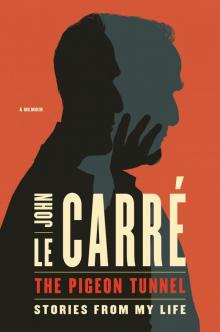 The Pigeon Tunnel: Stories From My Life
The Pigeon Tunnel: Stories From My Life Single & Single
Single & Single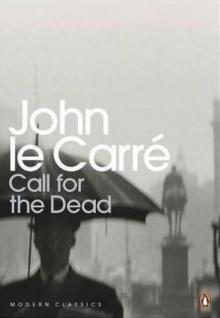 The Spy Who Came in From the Cold
The Spy Who Came in From the Cold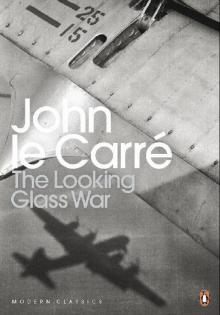 The Looking Glass War
The Looking Glass War The Night Manager
The Night Manager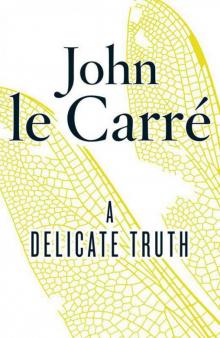 A Delicate Truth
A Delicate Truth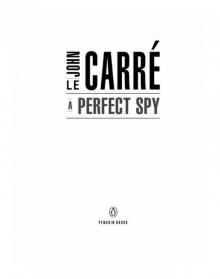 A Perfect Spy
A Perfect Spy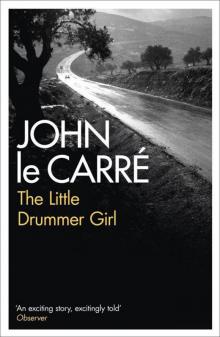 The Little Drummer Girl
The Little Drummer Girl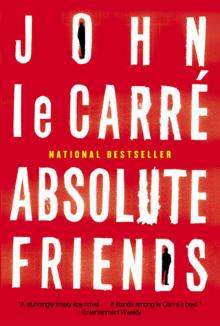 Absolute Friends
Absolute Friends A Murder of Quality AND Call for the Dead
A Murder of Quality AND Call for the Dead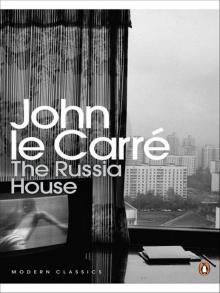 The Russia House
The Russia House The Tailor of Panama
The Tailor of Panama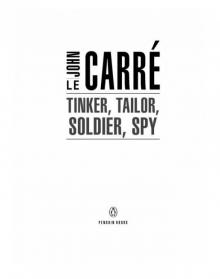 Tinker, Tailor, Soldier, Spy
Tinker, Tailor, Soldier, Spy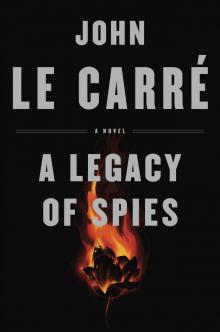 A Legacy of Spies
A Legacy of Spies The Mission Song
The Mission Song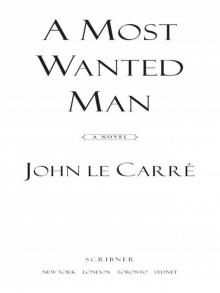 A Most Wanted Man
A Most Wanted Man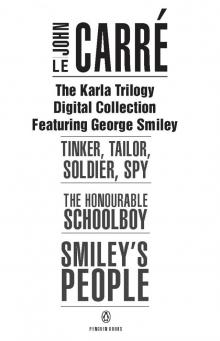 John Le Carré: Three Complete Novels
John Le Carré: Three Complete Novels The Secret Pilgrim
The Secret Pilgrim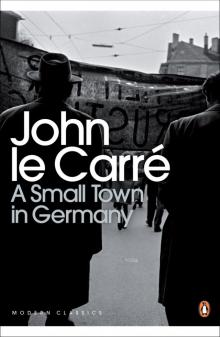 A Small Town in Germany
A Small Town in Germany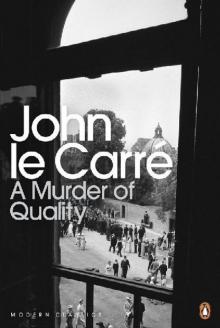 A Murder of Quality
A Murder of Quality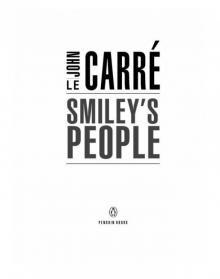 Smiley's People
Smiley's People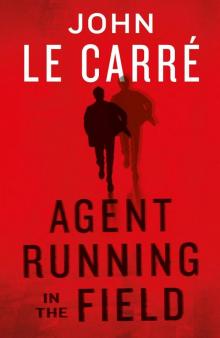 Agent Running in the Field
Agent Running in the Field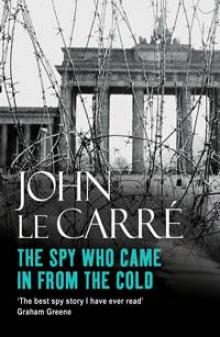 The Spy Who Came in from the Cold s-3
The Spy Who Came in from the Cold s-3 The Pigeon Tunnel
The Pigeon Tunnel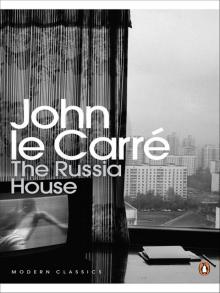 The Russia House - 13
The Russia House - 13 The Honourable Schoolboy
The Honourable Schoolboy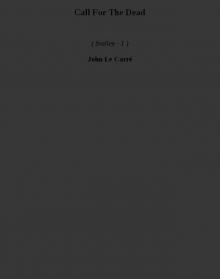 Call For The Dead s-1
Call For The Dead s-1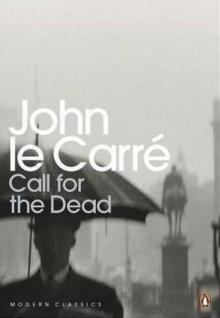 Call for the Dead
Call for the Dead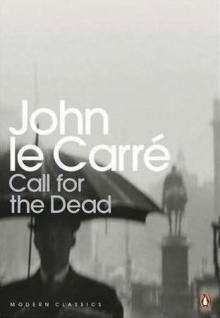 Call for the Dead - 1
Call for the Dead - 1